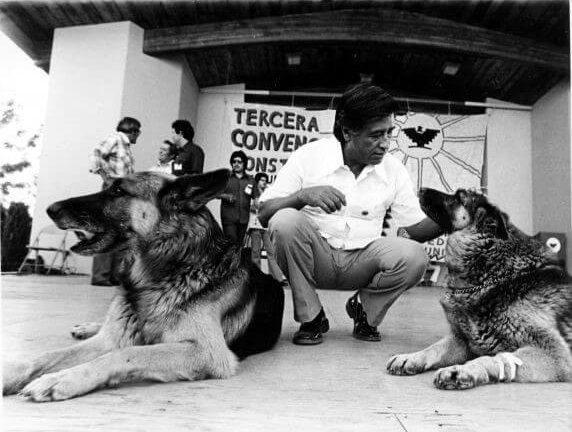
I would go one step further. To honor the Chávez legacy more fully, we should follow in his footsteps and stop eating animals, his friends. Although he is best known as the founder of the United Farm Workers of America, Chávez’s passion for justice did not stop with humans. In early 1968, in an effort to rededicate the farm-worker movement to nonviolence, Chávez embarked on a 25-day fast (one of several). He subsequently became a vegetarian and remained one for the rest of his life. Marc Grossman, Chávez’s longtime personal aide and spokesperson, told PETA, “César was a devoted proselytizer; I think he took almost as much personal satisfaction from converting people to vegetarianism as trade unionism.”
His decision to shun animal flesh is hardly surprising when you consider that the exploitative jobs on factory farms and in slaughterhouses represent what he fought against. Human Rights Watch has called meatpacking “the most dangerous factory job in America,” and according to the U.S. Department of Labor, nearly one in three slaughterhouse workers suffer from illness or injury every year. In other manufacturing jobs, the rate is one in 10.
Killing animals who do not want to die is inherently dangerous work. As chickens and turkeys are hung up by their legs to be killed, they fight back—beating their wings and scratching and pecking workers. Cows and pigs who are still conscious when they are hung up by their hind legs kick and thrash.
But the meat industry refuses to create safer working conditions by slowing down the killing lines. Just the opposite: According to an article in The Washington Post, the National Chicken Council has been spending an average of more than $500,000 per year to lobby in support of a proposal that would speed up poultry-processing lines by 25 percent—even though worker-safety groups say that such a move will surely result in more injuries.
Slaughterhouse workers must hoist, kill or cut dozens of animals each minute, usually with few breaks, and more than 40 percent of them suffer from carpal tunnel syndrome, a government study found.
Some workers aren’t even given time to relieve themselves during their shift. A teamster investigator told The Nation magazine that during meetings with slaughterhouse workers, “People were crying, talking about being covered in diarrhea the entire shift because the supervisor wouldn’t let them go to the bathroom.”
When employees are forced to work covered with their own waste, you can imagine how much worse the animals they handle are treated. Improperly stunned pigs scream as they are dropped into tanks of scalding-hot water, used to soften their skin on the way to becoming bacon this and bacon that. Cows writhe in pain as the skin is torn from their bodies. Chickens’ throats are slit while they’re still conscious.
César Chávez said, “Kindness and compassion towards all living beings is a mark of a civilized society.” Please honor him by taking a few minutes to watch one of PETA’s online exposés of meat production—perhaps “Glass Walls,” narrated by another icon, Paul McCartney—and it will be easy to see why Chávez chose to become a vegetarian. Anyone can fight for justice, at least for one day.





